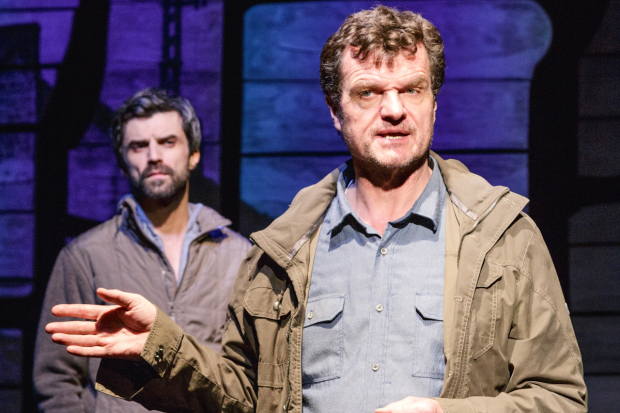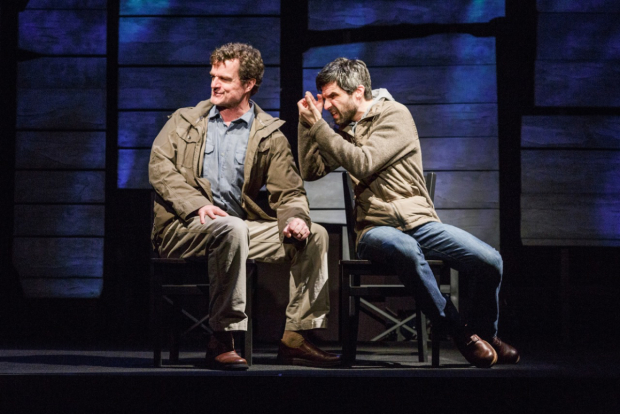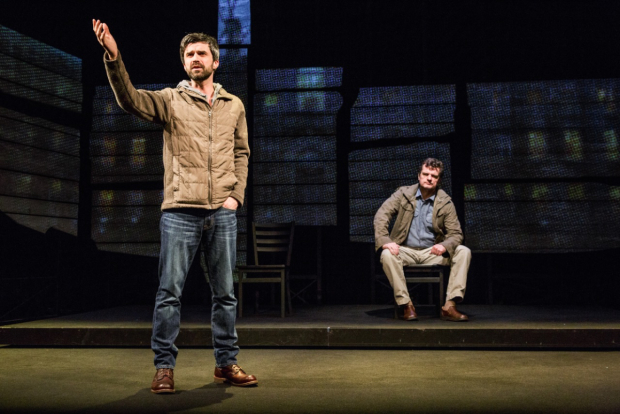
(© James Leynse)
Somalia, Afghanistan, Rwanda, and the newly thawed Arctic: Pulitzer Prize-winning Canadian photojournalist Paul Watson has covered some of the most volatile places on earth, taking unforgettable pictures along the way. Dan O'Brien's new play, The Body of an American, which takes on Watson as its subject, is now making its New York debut with Primary Stages at the Cherry Lane Theatre. Although the play received critical acclaim in London and won the 2013 PEN Center Award for Drama, it is difficult to see what all the fuss is about in this disappointing two-hander.
The Body of an American is about the relationship between two men: Watson (mostly Michael Cumpsty) and playwright Dan O'Brien (mostly Michael Crane). I say "mostly" because the two actors play a myriad of other characters and occasionally switch roles (not as confusing as it sounds, but still needlessly complicated). After Dan hears an interview with Paul on NPR's Fresh Air, he becomes intrigued and begins an e-correspondence with the journo. Eventually, the two men meet in person on Paul's new beat: Victoria Island in the frozen north. Throughout, Dan states his intention to turn it all into a play. So meta!

(© James Leynse)
The titular American body is that of Staff Sergeant William David Cleveland, a crew chief on one of the two U.S. Army helicopters shot down over Somalia in 1993 (an event immortalized in the 2001 film Black Hawk Down). Watson took a photo of Cleveland's dead body as it was dragged through the streets of Mogadishu, earning his subsequent Pulitzer. The public backlash from this image led the Clinton administration to pull out of Somalia. "If you do this, I will own you forever," the disembodied voice of Cleveland allegedly told Watson before he snapped the picture.
What begins as a compelling ghost story (a meditation on guilt and its relationship to success) sadly devolves into an exercise in maudlin self-importance when Paul calls Cleveland's family looking for closure. "I believe your brother would still be alive today if people had known the truth," he tells Cleveland's brother (he had witnessed a similar desecration of the bodies of dead American servicemen a week before, but hadn't caught it on film). In response, the brother curtly requests that Paul never contact his family again. Crane's portrayal of this no-nonsense airman is among the most truthful and enlightening of the evening.
Even at his most vulnerable, there is an impassable barrier to Paul's soul, a callus developed from decades of war reporting. "Everything has this kind of Hemingway patina to it," Dan complains about Paul's war stories. It is never pierced by the end of the play. Navigating that fact, Cumpsty brings an implacable creepiness to the role: Describing the misery of a Rwandan refugee camp in which a young girl wanders through a field of corpses, he slightly grins and says, "This would make a great picture." As unnerving as it is, it feels credible. Crane is equally believable as the sensitive playwright with a penchant for depression. Snowbound in an Ulukhaktok hotel room with no booze, they make quite a pair.
One gets the sense that this story actually wants to be a buddy memoir, a dark answer to Tuesdays With Morrie (the annoying convention of projecting scene titles on the upstage wall reinforces this notion). Despite all the war and death and globally relevant stage action, the author can't seem to help himself from butting into the story: When Dan begins to talk about his estranged (and strange) family, the play takes on the frustrating undertones of a therapy session.

(© James Leynse)
On top of this, O'Brien's text often veers into theatrical cliché: "Sand snow sand snow sand snow sand snow," Dan rhythmically chants before discussing his flight to the Northwest Territories. At another moment, Paul crouches around Cleveland's body, repeating the word "click." The actors furiously circle, cross, and shift character in Jo Bonney's deceptively lackadaisical staging. Richard Hoover's minimalist set consists of two chairs backed by towers of white slats on which Alex Basco Koch displays his illustrative projections. It's mostly forgettable though. A few false epiphanies wrapped in self-pity and uninspired stagecraft, The Body of an American looks and feels a lot like a one-man show in a fringe festival (but with two men).
None of this is to say that Watson's life and work is unsuitable for theatricalization. On the contrary, Watson (who recently departed his job at The Toronto Star after receiving pushback on his reporting about the fabrications of a well-connected businessman) seems a human synthesis of controversy and conviction — an ideal subject for drama. Unfortunately, O'Brien never satisfyingly gets under Watson's Kevlar vest of mental self-preservation to offer us a deeper understanding of the man and his motives. It's hard to walk away not wishing for our 90 minutes back.









